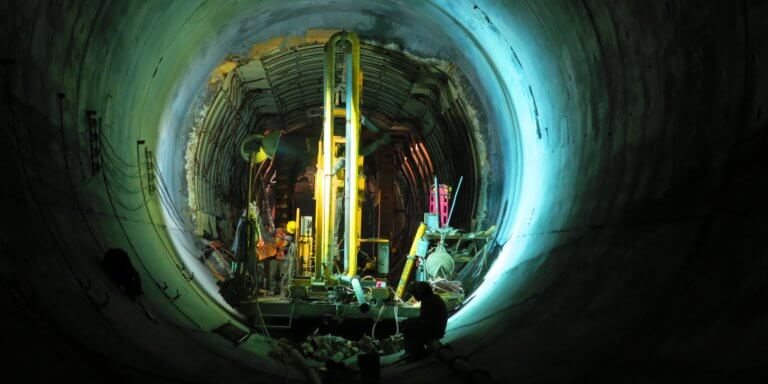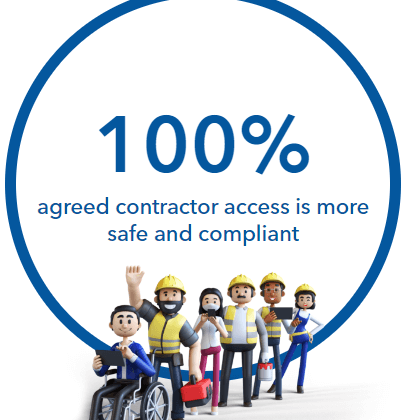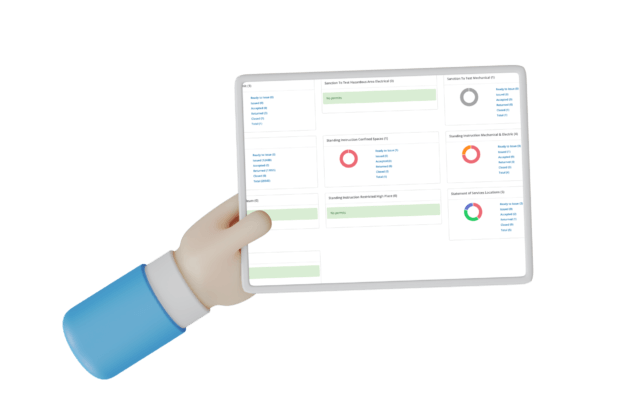- Why Verature?Find out why Verature is the best system for continuous contractor compliance.
- Arrive, Work & Stay Safe
- Removes Paper & Spreadsheets
- Tracks Key Contractors
- Instant 360 Visibility
- Contractor Management Dashboards
- Why Contractor Management Software
- Our Customer Reviews
- Pricing
We don’t hide behind fancy sales teams before we tell you, our prices.- Clients
See who we are working with and what they have to say about Verature.- Resources
Check out our blog, useful guides, whitepapers and product videos.- Prequalification and Induction Guide
- Contractor Compliance Guide
- Mini-Audit your Permit to Work System
- Health and Safety Audit Checklist
- Resource Library
- Blog
Book a demo
What is Contractor Compliance? A Comprehensive Guide
Book a demoIn today’s fast-paced business environment, ensuring contractor compliance, workplace safety, and proper document management are paramount to success. Managing these aspects efficiently can save time, reduce risks, and protect your workforce. Whether you’re dealing with contractors, workplace safety, or document tracking, this guide will provide valuable strategies and introduce Verature, a powerful tool to streamline your operations.
Contents
Section 1: Understanding Contractor Compliance
1.1 What is Contractor Compliance?
Contractor compliance is the backbone of a well-functioning workplace. It encompasses the checks and procedures that organisations implement to ensure that contractors and subcontractors conform to regulations and health and safety standards while on the job. This compliance is not a standalone process; it’s a crucial component of your broader contractor management strategy.
Here’s a closer look at why defining and upholding contractor compliance is crucial:
- 1. Maintaining Workplace Safety: Contractor compliance is integral to ensuring workplace safety. Contractors often perform tasks that involve inherent risks, and any non-compliance with safety protocols can lead to accidents, injuries, or even fatalities. By adhering to safety standards, contractors contribute to a safer working environment for all.
- 2. Regulatory Adherence: Many industries are heavily regulated, with strict rules governing aspects like environmental protection, quality control, and employee welfare. Contractor compliance ensures that these regulations are met, mitigating the risk of legal repercussions and financial penalties.
- 3. Operational Efficiency: A compliant contractor is more likely to align with the project’s goals, timelines, and quality standards. Non-compliance can lead to project delays, increased costs, and a loss of overall efficiency.
- 4. Reputation and Stakeholder Trust: Organisations that prioritise contractor compliance demonstrate their commitment to responsible business practices. This commitment enhances their reputation, fosters stakeholder trust, and can lead to more business opportunities.
- 5. Risk Mitigation: Non-compliance can expose organisations to a range of risks, including legal, financial, and reputational. By emphasising contractor compliance, these risks can be minimised, protecting the company’s interests.
In the broader context of contractor management, compliance is not a static state but an ongoing commitment. It requires continuous monitoring, evaluation, and improvement to ensure that contractors consistently meet the established standards and expectations.
The Relationship Between Contractor Compliance and Workplace Safety
Contractor compliance and workplace safety are intricately linked aspects of any organisation’s operations. A failure in contractor compliance can directly impact the safety of the workplace and its occupants. Here’s a closer examination of this relationship:
- 1. Safety Protocols: Compliance with safety protocols is a fundamental aspect of contractor compliance. Contractors must follow safety guidelines, wear appropriate personal protective equipment (PPE), and adhere to established safety procedures to minimise workplace accidents.
- 2. Hazard Identification and Mitigation: Part of compliance involves contractors identifying potential hazards in their work and taking measures to mitigate them. Failure to do so can lead to unsafe working conditions that jeopardise the well-being of employees and contractors alike.
- 3. Training and Competency: Compliance often includes requirements for contractor training and competency assessments. These measures ensure that contractors possess the necessary skills and knowledge to perform their tasks safely in the workplace.
- 4. Reporting and Incident Response: Contractors must comply with reporting requirements for accidents, near-misses, and safety incidents so that any risks or hazards identified in the workplace may be remedied. Timely reporting is crucial for addressing safety concerns promptly.
- 5. Accountability: A compliant contractor understands their accountability for safety outcomes. They recognise that their actions can directly impact workplace safety and take responsibility for their role in maintaining it.
In essence, contractor compliance is a linchpin in the broader safety framework of an organisation. When contractors adhere to compliance standards, they contribute to a culture of safety, reducing the likelihood of accidents and creating a secure work environment.
But how can you encourage a culture of safety?
For 3 tips on how you can manage workplace safety compliance, check out our useful article: How Can I Manage Workplace Safety Compliance?
The Role of Document Management in Contractor Compliance
Effective document management is an indispensable component of contractor compliance. It ensures that all relevant documentation is organised, accessible, and up-to-date, supporting the verification of compliance with established standards. Here’s why document management is essential for contractor compliance:
- Verification and Audit Trail: Comprehensive documentation provides a clear trail that can be audited to confirm compliance. This includes records of training, certifications, safety procedures, and contractual agreements.
- Regulatory Documentation: Many industries require specific documentation to prove compliance with regulations. Proper document management ensures that these documents are readily accessible and maintained in accordance with regulatory requirements.
Contractor compliance is about ensuring adherence to rules and safety standards throughout the contractor’s journey, from pre-arrival to departure, ensuring workplace safety. An integral part of that is controlling the documentation surrounding contractor compliance.
1.2 The Challenges of Contractor Compliance
Managing contractor compliance can be a daunting task due to several challenges. The sheer volume of contractors across multiple sites can overwhelm small teams. Time-consuming tasks, such as meticulously reviewing compliance documentation, made more time-consuming by the manual task of chasing up this documentation, divert attention from more valuable responsibilities. Moreover, evolving regulations and a lack of oversight further compound the complexity.
Here’s a breakdown of the common challenges:
- Identifying Common Challenges Faced in Contractor Compliance: Contractor compliance is a complex process, and organisations often encounter several common challenges in this domain. These challenges can include issues related to contractor qualification, adherence to safety protocols, and regulatory compliance. Identifying these challenges is the first step towards finding effective solutions and ensuring that contractors operate safely and in compliance with established standards.
- Time-Consuming Tasks and Their Impact on Your Team: One of the most significant challenges in contractor compliance is the time-consuming nature of the tasks involved. Managing contractors often require extensive paperwork, from verifying qualifications to tracking training records. This can place a considerable administrative burden on your team, diverting valuable time and resources away from other critical tasks. The more time your team spends on administrative work, the less time they have for strategic activities that can drive your organisation forward.
- Lack of Oversight and Workforce Visibility: Another critical challenge is the lack of oversight and workforce visibility. When contractors are on-site, it’s essential to have real-time visibility into their activities and compliance with safety regulations. Without proper oversight, compliance gaps can emerge, potentially leading to safety incidents or regulatory violations. Achieving full visibility into contractor operations is essential for risk management and ensuring that your workplace remains safe.
- The Issue of Version Control Over Compliance Requirements: Version control problems can be a significant issue in contractor compliance. Compliance requirements are often updated, and it’s crucial to ensure that contractors are working with the most current standards and procedures. Failing to manage version control effectively can result in contractors using outdated documents or procedures, putting both compliance and safety at risk. It can also lead to confusion and miscommunication, as different parties may be working from different versions of critical documents.
- Adapting to Changing and Evolving Standards: Compliance standards are not static; they evolve over time. Staying up-to-date with changing regulations and industry standards is a constant challenge. Failure to adapt to these changes can result in non-compliance and regulatory penalties. Organisations must have systems in place to monitor and respond to evolving compliance requirements promptly.
Challenges in contractor compliance range from resource constraints and lack of oversight to evolving regulations, making a robust compliance system essential.
1.3 Why is Contractor Compliance Important?
Contractor compliance is crucial for several reasons. First and foremost, it safeguards your company’s reputation and protects the well-being of individuals on your site. Failing to meet compliance standards can result in fines and penalties, while proper compliance can eliminate reputational damage, legal actions, and unsafe work environments.
- The Impact of Non-Compliance on Your Company’s Reputation: Contractor compliance holds a significant bearing on your organisation’s reputation. When your company collaborates with contractors, clients, partners, and the public expect you to uphold high standards of safety, quality, and ethics. Any instance of non-compliance can tarnish your reputation and erode trust among stakeholders.
- For instance, news of a safety violation, environmental damage, or unethical practices involving contractors can quickly spread through social media and news outlets. Such incidents can lead to public outrage, damage your brand’s image, and result in long-term reputational harm. A tarnished reputation can deter potential clients, partners, and investors, impacting your organisation’s growth and profitability. Effective contractor compliance is essential to uphold your company’s integrity and maintain stakeholder trust.
- Legal and Financial Risks Associated with Poor Contractor Compliance: Poor contractor compliance can expose your organisation to substantial legal and financial risks. Non-compliance with safety regulations, environmental standards, or contractual obligations can result in costly legal disputes, fines, penalties, and legal fees. Depending on the severity of the violation, these financial repercussions can be crippling and significantly impact your bottom line.
- In addition to direct financial costs, non-compliance can lead to indirect financial consequences. For example, accidents or environmental incidents involving non-compliant contractors can result in property damage, personal injury claims, and increased insurance premiums. These financial burdens can strain your organisation’s resources and hinder its ability to invest in growth and innovation.
- The Role of Effective Contractor Compliance in Risk Mitigation: Effective contractor compliance serves as a cornerstone of risk mitigation for your organisation. By ensuring that contractors adhere to safety protocols, environmental regulations, and contractual obligations, you reduce the likelihood of accidents, environmental incidents, and legal disputes. This proactive approach not only safeguards your organisation against costly liabilities but also protects the well-being of your workforce and the communities in which you operate.
- Moreover, robust contractor compliance demonstrates your commitment to responsible business practices. This commitment can enhance your organisation’s attractiveness to clients, partners, investors, and regulatory authorities. It positions your company as a reliable and trustworthy partner in a competitive marketplace.
Contractor compliance is essential for maintaining reputation, avoiding legal repercussions, and ensuring a safe work environment for all.
Section 2: Best Practices for Contractor Compliance
2.1 Streamlining Compliance with Verature
An Introduction to Verature’s Contractor Management Software
Verature’s Contractor Management Software is a powerful tool designed to simplify and streamline contractor compliance, workplace safety, and document management. It offers a comprehensive solution for organisations looking to enhance their compliance processes, reduce risks, and improve overall efficiency.
Verature’s software provides a centralised platform where all aspects of contractor management can be seamlessly integrated and managed. From onboarding new contractors to tracking compliance documents and monitoring safety protocols, Verature offers a user-friendly interface that empowers organisations to take control of their compliance efforts.
How Verature Can Save Time, Effort, and Costs for Your Organisation
One of the standout features of Verature is its ability to save significant amounts of time, effort, and costs for organisations. Here’s how:
- Automation: Verature automates many of the manual and time-consuming tasks associated with contractor compliance. This includes sending reminders for document renewals, conducting compliance checks, and managing approvals.
- Centralisation: By centralising all contractor-related data and processes in one platform, Verature eliminates the need to navigate through multiple systems or rely on paper-based documentation. This simplifies data access and reduces the risk of errors.
- Efficient Communication: Verature facilitates efficient communication between all stakeholders, including contractors, employees, and management. This ensures that everyone is on the same page regarding compliance requirements and safety protocols.
- Customisation: Verature can be customised to fit the specific needs and processes of your organisation. Whether you have unique compliance requirements or workflows, Verature can adapt to your requirements.
For more info on how Verature can help you achieve contractor compliance read our blog: Let’s talk About Contractor Compliance
Testimonials from Clients Who Have Benefited from Verature
To underscore the effectiveness of Verature’s Contractor Management Software, find testimonials from our satisfied clients:
Verature use for Exhibition Stands at Events ☺Easy to add companies and people to the system and easy to find them to view their docuements. ☹The expiration of links sent to companies and people to upload documents is sooo short.Ellena T.06/02/2023Verature review We are more streamlined now due to being able to send out inductions and requires before there arrival ☺Ease of use when inducting with the table allow more portability ☹There isn't a dedicated back button. after you have viewed a persons details you go back it looses the filters you had appliedJames G.10/01/2023security review great product which gives the team the adequate data that we need to keep our site safe ☺easy interface easy to find contractors and review who should or shouldn't be on site ☹i dont find it difficult at all to use and manage , no issues from me or the teamDaniel H.05/01/2023Induction Control ☺Very easy to use, once I had received the necessary training on how to complete what was expected ☹As yet I have not had an issue with the softwareHayden L.01/11/2022Verature ☺Verature is relatively user friendly and intuitive ☹The software runs quite slowly and often needs manual refreshingLee J.30/09/2022Verature ☺An easy way to book visitors to site, once someone is in the system the auto populate function makes life easy for returning visitors ☹Took me a little while to learn my way round, not as obvious say as Office products but easy once you know how.Colin C.06/09/2022Gatehouse Management great loved the software since its introduction ☺The system / software is : User friendly The system / software is :Quick The system / software is :Over views The system / software is :Auditing ☹I cant think of any issues to be negative on the software or dashboard its all really good.Stephen P.02/09/2022Intuitive software, customer focussed provider Positive overall. The solution has taken a long time to develop to meet our needs, but it is a good solution and I am confident that Target will continue to support any future requirements ☺It is well designed so inituitive and easy to use. ☹Time it has taken to implement some elements of itBernice G.26/08/2022Verature Good overall ☺Easy to use and fairly simple. Used at most sites. ☹Quite detailed, a bit glitchy. Need to eliminate need for emailJames T.23/08/2022Capterra rating score: 4.3 of 5, based on 27 reviewsVerature has helped organisations to overcome compliance challenges, reduce risks, and enhance their overall operations.
2.2 Creating a Centralised Contractor Playbook
The Importance of a Comprehensive Contractor Playbook
A comprehensive contractor playbook serves as a vital resource for organisations aiming to maintain high levels of contractor compliance. This section should delve into the significance of such a playbook, emphasising the following points:
- Guidance: A playbook provides clear guidance on compliance requirements, safety protocols, and expectations for contractors. It serves as a reference document that helps contractors understand what is expected of them.
- Consistency: With a centralised playbook, organisations can ensure that all contractors receive consistent information and instructions. This consistency is essential for compliance and helps prevent misunderstandings or misinterpretations.
- Clarity: The playbook should communicate compliance and safety requirements in a clear and straightforward manner. This clarity reduces the likelihood of confusion or non-compliance due to misunderstandings.
How a Centralised Contractor Management System Facilitates Compliance
A centralised contractor management system, like Verature, complements and enhances the effectiveness of a comprehensive contractor playbook. Key points to cover include:
- Integration: Verature can seamlessly integrate with the contractor playbook, ensuring that the playbook’s guidelines are reflected in the software. This integration aligns the playbook with real-time compliance tracking and management.
- Accessibility: Verature’s uncapped users makes the playbook easily accessible to all relevant parties, including contractors and employees. This accessibility ensures that everyone has access to up-to-date compliance information.
- Updates and Revisions: Verature’s high personalisation and unmatched Support team means that when compliance requirements change, the playbook can be updated and revised within Verature. This ensures that contractors are always working with the latest compliance standards.
A centralised playbook, when integrated with Verature, helps organisations maintain consistency in compliance efforts and stay aware of evolving regulatory and/or company requirements. It becomes a dynamic resource that adapts to changes in regulations or company policy, keeping everyone informed and aligned with compliance goals.
2.3 Standardised Processes and Templates
Implementing Standardised Contractor Management Processes
The benefits of standardisation in contractor management:
- Efficiency: Standardised processes streamline workflows, reducing redundancy and ensuring tasks are completed consistently.
- Risk Reduction: Standardisation minimises the chances of errors or omissions in compliance processes, reducing compliance-related risks.
- Scalability: Standardised processes can be scaled to accommodate a growing number of contractors and changing compliance requirements.
Pre-approved templates/forms can simplify compliance processes and minimise risk by ensuring:
- Consistency: Templates ensure that documentation and communications with contractors adhere to established standards. For example, a templated communication email or training document sent to contractors invited to do work.
- Time Savings: Using templates saves time by providing a structured framework for compliance-related documents.
- Compliance Assurance: Pre-approved templates help organisations ensure that documents and their process, meet regulatory requirements.
Hand in hand with templated forms and documents are prescripted workflows; these can be automated and enforced via the use of a system. For example, Verature’s workflows enhance compliance and safety in a number of ways:
- Automation: Verature’s workflows automate compliance processes, ensuring that tasks are completed systematically.
- Notifications: Workflows can send notifications for pending compliance tasks, reducing the risk of oversights.
- Efficiency: Verature’s workflows increase efficiency by guiding users through compliance processes step by step.
2.4 Storing Contractor Details in a Central Repository
There are many benefits of a centralised repository for storing contractor data; overall it provides:
- Accessibility: A central repository ensures that relevant personnel can access contractor information easily.
- Efficiency: It streamlines data management by eliminating the need to search through multiple systems or locations.
- Consistency: Centralised data ensures that everyone works with the same, up-to-date information.
Centralising contractor data enhances visibility and consistency across departments and sites, ensuring:
- Cross-Department Collaboration: A central repository fosters collaboration among departments that require contractor data.
- Consistent Information: It ensures that contractor data is consistent across different sites or locations.
- Streamlined Communication: Centralised data simplifies communication regarding contractor compliance.
A central repository helps organisations maintain control over document versions and helps them identify expired compliance requirements or any compliance gaps more easily. A central repository helps improve:
- Version Tracking: Systems that include a central repository, such as Verature, can track document versions, ensuring that outdated documents are automatedly chased up.
- Audit Trail: Verature serves to provide an audit trail of documents that have expired, been rejected or approved, aiding in compliance audits and reviews.
- Compliance Assurance: Version control ensures that contractors work with the latest compliance documents.
2.5 Setting Up Compliance Approval Processes
An approval workflow is a defined process or set of rules, and mechanisms through which a document, job or contractor is deemed as and can be ‘approved’. It defines who is responsible for approving an item above, the steps through which it should pass before it may be approved, and then the formal action of ‘approval’. This can vary between organisations and thus should be configurable. Systems often serve to entrench approval workflows as they prevent a user from bypassing any of the defined stages and make sure that items are approved only by those appropriate responsible persons.
So why are approval workflows important in contractor compliance?
- Compliance Verification: Approval workflows verify that contractors meet compliance requirements before commencing work.
- Risk Mitigation: They reduce the risk of non-compliant contractors working on projects.
- Documentation: Approval workflows provide documented evidence of compliance checks by appropriate responsible and competent persons.
The advantages of having a well-defined approval process:
- Consistency: Defined processes ensure that compliance checks are conducted consistently for all contractors.
- Efficiency: They streamline the approval process, reducing delays in contractor onboarding.
- Transparency: Defined processes provide transparency into compliance verification.
Organisations often turn to systems to help with their approval workflows for the reasons described above. Verature supports compliance with approval workflows that include:
- Automation: Verature automates approval workflows, reducing manual effort and ensuring that no steps are missed.
- Notifications: The software can send notifications to relevant personnel when approval tasks are pending or completed.
- Documentation: Verature provides a documented record of compliance approvals for auditing purposes.
2.6 Keeping Up to Date with Changes
The ever-changing landscape of compliance requirements must be monitored to take into account:
- Regulatory Updates: Compliance standards and regulations can change frequently, necessitating continuous monitoring.
- Industry Shifts: Industry-specific compliance requirements may evolve in response to technological advancements or emerging risks.
- Organisational Changes: Internal processes or contractor relationships may change, impacting compliance needs.
It is important to stay informed about regulatory changes for the following reasons:
- Compliance Maintenance: Staying updated ensures that compliance processes remain effective and relevant.
- Risk Mitigation: Timely awareness of regulatory changes helps mitigate risks associated with non-compliance.
- Legal Compliance: Failure to comply with new regulations can have legal implications.
Organisations can adapt their contractor management processes to accommodate regulatory changes by taking the following steps:
- Continuous Monitoring: Regularly monitor regulatory updates relevant to your industry or region. A quick tip: Sign up for relevant HSE bulletin and other industry-specific news.
- Process Flexibility: Ensure that contractor management processes are flexible enough to incorporate new compliance requirements. Making them too onerous or difficult to change is a sure way to find your processes quickly out of date and non longer compliant.
- Training and Awareness: Train relevant personnel to understand and implement new compliance standards.
- Verature Integration: Verature can adapt to new compliance requirements and facilitate compliance changes seamlessly.
Read our Contractor Compliance Guide to Processes and Best Practices for more info.
Section 3: Managing Workplace Safety Compliance
3.1 The Significance of Workplace Safety Compliance
- Workplace Safety as a Cornerstone of Business Development: Workplace safety isn’t just a box to check; it’s a fundamental pillar of business development. A safe workplace contributes to the overall well-being and morale of employees and contractors, leading to increased job satisfaction and productivity. Moreover, it can be a powerful marketing and recruitment tool. Companies known for their commitment to safety are more likely to attract clients who prioritise working with responsible partners. Additionally, skilled workers often seek out employers with strong safety records, viewing them as more desirable places to work.
- Legal Obligations and Consequences of Non-Compliance: Compliance with workplace safety regulations isn’t just about avoiding fines; it’s a legal obligation that carries serious consequences if neglected. Failing to meet safety requirements can result in hefty fines, legal actions, and even the closure of a business in extreme cases. Beyond the financial costs, there are reputational risks. Companies that repeatedly violate safety regulations can damage their reputation, making it harder to win contracts and secure partnerships. Legal compliance is not just a moral duty but also a legal one, and ignoring it can have severe consequences.
- The Role of Safety Culture in Ensuring a Safe Workplace: A strong safety culture is paramount for workplace safety compliance. It involves ingraining safety as a core value within an organisation and promoting safe behaviour at all levels. This culture encourages employees and contractors to take personal responsibility for their safety and that of their colleagues. It emphasises the timely reporting of incidents, near misses, and hazards. Leaders play a crucial role in fostering this culture by setting an example and prioritising safety in decision-making. An effective safety culture goes beyond following rules; it becomes an intrinsic part of the organisation’s identity.
3.2 Three Tips for Workplace Safety Compliance
- Leading by Example to Encourage Compliance: Leadership sets the tone for workplace safety compliance. Managers and supervisors should lead by example, consistently following safety protocols and demonstrating their commitment to safety. When employees and contractors see that leadership values safety, they are more likely to take it seriously themselves. Leading by example creates a culture where safety isn’t just a set of rules but a way of working and living.
- The Importance of Appropriate Training for Staff and Contractors: Adequate training is the bedrock of workplace safety compliance. Every employee and contractor should receive comprehensive safety training tailored to their specific roles. This training should encompass not only general safety protocols but also the specific risks associated with their tasks. It should cover emergency procedures, proper use of safety equipment, and hazard identification and mitigation. Regular refresher courses and continuous education are essential to ensure that safety knowledge remains up to date.
- Fostering Open Lines of Communication for Hazard Awareness: Effective communication is a vital tool for hazard awareness and mitigation. Employees and contractors should feel comfortable reporting safety concerns, incidents, and near misses without fear of reprisal. Establishing clear reporting procedures and encouraging open dialogue helps identify and address potential safety issues before they escalate. Regular safety meetings and discussions promote hazard awareness and provide a platform for sharing safety-related insights and best practices. Open communication ensures that everyone is vigilant about safety and contributes to a safer work environment.
Section 4: Boosting Contractor Compliance in 5 Steps
Step 1: Plan the Requirement of the Job
Before any work begins, a well-defined project plan and job requirements are necessary. This step involves comprehensive planning and risk assessment to choose the right contractor. It’s an opportunity to communicate requirements, eliminate hazards, and establish safe work methods.
Thorough planning and risk assessment set the foundation for choosing the right contractor and ensuring safety.
Step 2: Ensure You Have the Correct Contractors
Vetting contractors is crucial. Conduct research to gather data on their work record, reputation, and accreditations. A pre-qualification process, which includes specific questions and document requests, helps assess their suitability for your project.
Pre-qualifying contractors ensures they meet your safety and performance standards, reducing risks and ensuring compliance.
Step 3: Create Inductions to Ensure Contractors Feel at Ease
Contractors often work in unfamiliar environments, so effective communication is key. Inductions should provide essential information, including safe work systems, site details, PPE requirements, emergency procedures, and contacts. Integrating the induction process with pre-qualification ensures compliance.
Contractor inductions enhance safety by familiarising workers with potential hazards and safety protocols.
Step 4: Schedule and Monitor Contractors on Site
Efficiently schedule and book work programs ahead of time to reduce bottlenecks at reception areas. Ensure contractors sign in and out for safety records. Maintain clear safety signage and contact while they work on-site, perform job audits and regularly remind workers of obligations from their inductions.
Efficient scheduling and monitoring processes enhance security and safety while reducing administrative hassles.
Step 5: Monitor, Follow-Up, and Review
Continuous monitoring is essential. Even with a robust risk assessment and project plan, projects evolve, and requirements change. Effective communication and record-keeping ensure everyone stays updated, enhancing contractor compliance.
Ongoing monitoring and communication are vital to ensure contractor compliance and adapt to changing project conditions.
Read more
Section 5: Document Management for Contractor Compliance
5.1 How to Track Contractor Compliance Documents
Managing compliance documents efficiently is essential for maintaining contractor compliance. Here are some of the best practices for organising and maintaining compliance records, emphasising the importance of a centralised approach:
Centralised Document Management: Centralising compliance documents in a single location is crucial. This approach eliminates the chaos of scattered files, reduces the likelihood of missing documents, and simplifies the audit trail process. With all documents in one place, organisations can quickly access, review, and verify compliance records.
Leveraging Software Systems: Many organisations rely on software systems or specialised compliance management tools to track contractor compliance documents. These systems offer advanced features such as automated reminders for document renewals, alerts for expiring licenses, and comprehensive reporting capabilities. They provide a real-time overview of compliance status, helping organisations stay proactive and keep track of key contractors.
Importance of Version Control: Document management isn’t just about storage; it also involves version control. It’s crucial to maintain the most up-to-date versions of compliance documents. Software systems often offer version control features, ensuring that outdated documents don’t inadvertently lead to non-compliance.
Streamlining Audits: Centralised and well-organised compliance documents simplify the audit process. When external auditors or clients request compliance records, organisations can quickly locate and provide the necessary documentation. This efficiency enhances an organisation’s reputation for compliance and reliability.
Efficient document management streamlines compliance processes, reduces the risk of non-compliance due to misplaced or outdated documents, and simplifies audits, ultimately saving time and resources.
5.2 Keep All Compliance Documents in One Place
Centralisation of compliance documents is essential for comprehensive contractor compliance. This section delves deeper into the advantages of centralisation:
Accessibility: Having compliance documents in one central repository ensures that authorised personnel can access them efficiently. Whether an organisation operates from multiple offices or job sites, this centralised approach guarantees that compliance records are readily available whenever needed.
Consistency and Oversight: Centralisation fosters consistency in how compliance documents are managed. It ensures that the same protocols and standards are applied across all locations. Furthermore, it provides compliance oversight, allowing organisations to monitor adherence to policies and procedures.
Security and Data Protection: Centralised document storage often includes robust security measures. Access controls, encryption, and backups help protect sensitive compliance data from unauthorised access, loss, or data breaches.
Simplified Management: Managing compliance documents becomes more straightforward when they’re all in one place. Organisations can implement standardised naming conventions, categorise documents effectively, and implement efficient filing systems.
Centralised document storage enhances accessibility, consistency and security, and simplifies compliance document management across an organisation’s various locations.
5.3 Keep Track of Expiration Dates
Tracking the expiration dates of insurance policies, licenses, and certifications is a critical aspect of contractor compliance. Here are a number of steps you can take to manage this:
Proactive Compliance: Regularly reviewing the expiration dates of compliance-related documents is a proactive approach. It ensures that contractors maintain up-to-date credentials and that organisations remain compliant with regulations.
Creating a Schedule: Establishing a schedule for reviewing active contractors and their compliance documents is a practical step. This schedule can include reminders to check expiration dates, conduct compliance assessments, and prompt renewals or updates.
Automation for Efficiency: Many organisations leverage software systems to automate the tracking of expiration dates. These systems send alerts or notifications as documents approach their expiration dates. Automation reduces the chances of overlooking critical deadlines and encourages timely document submissions. Verature puts the onus on the contractor and chases them directly to maintain expiring compliance documents.
Contractor Engagement: Implementing an expiration date tracking system also engages contractors in compliance efforts. When they receive timely reminders to renew or update their documents, contractors are more likely to maintain compliance.
Timely tracking of expiration dates is a proactive strategy that reduces compliance risks, ensures contractors submit required documents promptly, and helps organisations maintain a consistent commitment to compliance.
5.4 Inform Contractors When Documents Are Not in Compliance
Effective communication regarding non-compliance is essential for maintaining contractor compliance. This section elaborates on the significance of immediate notifications and clear communication:
Prompt Notification: When organisations identify non-compliance issues, they should promptly notify the relevant contractors. Clear communication about what needs to be corrected, supplemented with specific guidance or requirements, is crucial.
Record Keeping: Maintaining records of all correspondence related to non-compliance is essential. These records serve as evidence of communication efforts and demonstrate an organisation’s commitment to compliance. They can also be valuable in case of disputes or audits.
Payment Incentives: Some organisations use payment incentives to motivate contractors to submit compliant documents promptly. For example, they may withhold payment until contractors rectify compliance issues. These incentives can expedite the resolution of non-compliance matters.
Continuous Improvement: Effective communication about non-compliance should also involve a feedback loop. Organisations and contractors can collaborate to address the root causes of non-compliance, leading to continuous improvement in compliance processes. For example, in Verature, both contractors and clients may provide feedback or further commentary regarding any compliance requirement, with feedback automatically sent where anything is deemed as ‘rejected’/ not meeting requirements.
Clear communication and prompt notifications expedite document submissions, reduce compliance gaps, and foster a collaborative approach to maintaining contractor compliance.
5.5 Use Contractor Management Software
Contractor management software, such as Verature, plays a significant role in streamlining compliance processes. Here are some key benefits of leveraging such software:
Automated Data Collection: Contractor management software automates the collection of contractor data, including compliance documents, certifications, and qualifications. This automation reduces manual data entry and minimises errors.
Compliance Checks: These software systems perform real-time compliance checks, ensuring that contractors meet all necessary requirements. Automated alerts and notifications inform both organisations and contractors of compliance status.
Centralised Contractor Data: Contractor management software centralises all contractor-related data, making it easily accessible to authorised personnel. This centralised repository simplifies data retrieval and reduces the risk of data fragmentation.
Efficient Search Capabilities: These systems often feature powerful search capabilities, allowing users to quickly locate specific contractor information or compliance records. This efficiency is especially valuable during audits or compliance checks.
Customisation: Contractor management software can be customised to align with an organisation’s specific compliance requirements and workflows. This flexibility ensures that the software adapts to the organisation’s unique needs.
Leveraging contractor management software improves efficiency, reduces manual effort, enhances data accuracy, ensures comprehensive compliance oversight, and simplifies contractor data management and document tracking. It is a valuable tool for organisations committed to contractor compliance.
Section 6: Implementing a Contractor Management System
6.1 How Can Verature Help with Contractor Compliance?
Leveraging software systems like Verature streamlines contractor compliance and document management. Such systems automate data collection, compliance checks, and document tracking. They offer centralised contractor data management and efficient search capabilities.
A deep dive into Verature’s features for streamlining compliance.
Now, let’s explore in greater detail how Verature’s Contractor Management System can be instrumental in bolstering contractor compliance within an organisation:
A Deep Dive into Verature’s Features for Streamlining Compliance:
- Comprehensive Compliance Tracking: Verature’s robust system offers an all-encompassing solution for tracking contractor compliance. It allows organisations to meticulously monitor various aspects of compliance, including contractor qualifications, certifications, safety records, insurance coverage, and more. Real-time dashboards and reports provide unparalleled visibility into compliance status, allowing organisations to stay on top of their contractor workforce’s adherence to regulatory standards.
- Automated Compliance Checks: Verature leverages automation to conduct rigorous compliance checks. This automation significantly reduces the manual effort required for compliance monitoring. It ensures that all contractors meet the requisite criteria before commencing work. Automated alerts are triggered to promptly notify organisations of any compliance gaps, enabling swift corrective actions.
- Document Management: Verature simplifies the often intricate task of document management by offering a centralised repository for all compliance-related documents. It incorporates advanced features such as version control and document expiration tracking. These functionalities ensure that organisations have access to up-to-date and accurate documents during audits, inspections, or client inquiries.
- Customisable Workflows: Verature’s workflows are highly adaptable to align seamlessly with an organisation’s specific compliance processes. This flexibility enables organisations to configure the system according to their unique compliance requirements, ensuring a tailored and efficient compliance management approach.
- Efficient Communication: Verature facilitates streamlined communication between organisations and contractors. It automates notifications related to document submissions, renewal reminders, and compliance updates. This automation significantly reduces delays, fostering clear and timely communication. Contractors are consistently informed about their compliance obligations, leading to improved compliance rates.
- Real-time Reporting: Verature empowers organisations with real-time compliance reporting capabilities. These reports offer invaluable insights into compliance performance, allowing organisations to make informed decisions regarding contractor selection, risk assessment, and the development of compliance strategies. Additionally, these reports can be instrumental in demonstrating compliance to clients, regulators, and internal stakeholders.
Learn how Verature’s 8-stage efficient process improves compliance performance. Real-world Examples of Businesses Benefiting from Verature:
Businesses from diverse industries have successfully harnessed Verature to enhance their contractor compliance efforts.
Wellcome Trust Case Study: Elevating Contractor Compliance with Verature
Wellcome Trust, a prominent charitable foundation focused on improving global health, faced challenges with its outdated contractor management system. Verature’s Contractor Control System provided them with a tailored solution, streamlining their contractor management process. Key benefits included automation, centralisation of data, and enhanced communication. Wellcome Trust now enjoys improved compliance control and an efficient system that facilitates real-time updates and data sharing across the organisation.
“The team at Verature deserve a round of applause; they have made this a really easy project to manage and have been brilliant at understanding our requirements and delivering Verature, the Shift Handover and our Induction Video. We would not hesitate to recommend the Verature system.”
Read full case studyJo Grunert Facilities & Workplace Project Manager
Sibelco Case Study: Streamlining Compliance Across Multiple Sites with Verature
Sibelco, a global material solutions company, sought a modern, cloud-based solution to manage visitor and contractor compliance across its multiple sites. Verature’s Contractor Compliance System enabled Sibelco to establish a structured and standardised compliance process, replacing manual methods like punch cards and spreadsheets. The result was increased efficiency, improved health and safety procedures, and a complete overview of visitors’ and contractors’ compliance status across all sites.
“The Verature system has been really well received at Sibelco; it’s clean and user friendly. We now have a complete overview of our visitors and contractors on each of our sites to ensure they’ve completed the required inductions. The system is making it easy to ensure we are remaining accountable for the safety of our contractors when on site.”
Read full case studyWendy Brunt Operations Administrator
Collins Aerospace Case Study: Enhancing Contractor Management with Verature
Collins Aerospace, a leader in aerospace and defence solutions, collaborated with Verature to streamline their contractor management. The Verature Contractor Management System optimised their daily operations, improved contractor compliance, and provided complete visibility of compliance requirements. Collins Aerospace achieved significant time savings, reduced manual processes, and enhanced contractor compliance. Through Verature’s system, they streamlined contractor inductions, automated document collection, and improved communication between different departments. The Kiosk functionality and automated workflows further improved operations, making the management of contractors more efficient and cost-effective.
These examples showcase how organisations have overcome compliance challenges, reduced risks, and experienced substantial operational improvements by implementing Verature. Verature’s solutions have successfully enhanced contractor compliance, streamlined processes, and improved communication for diverse organisations, ultimately resulting in more efficient and effective compliance management.
The role of Verature in reducing risk exposure and saving resources.
Verature plays a pivotal role in mitigating risk and optimising resources:
- Risk Mitigation: By ensuring that contractors consistently comply with safety regulations, possess the necessary qualifications, and maintain up-to-date insurance coverage, Verature helps organisations mitigate the substantial risks associated with non-compliance. This proactive approach safeguards organisations against potential legal, financial, and reputational liabilities.
- Resource Efficiency: Verature’s automation features and centralised data management significantly reduce the manual workload typically associated with compliance tracking and document management. This heightened efficiency translates into tangible cost savings, as organisations can allocate resources more judiciously and reduce their reliance on additional administrative staff.
- Audit Preparedness: Verature’s robust document management and reporting capabilities position organisations to be audit-ready at all times. Retrieving compliance records, demonstrating adherence to standards, and promptly addressing any compliance concerns become streamlined processes, ultimately contributing to a more comprehensive and efficient compliance framework.
- Enhanced Decision-making: Verature equips organisations with data-driven insights into their contractors’ compliance status. These insights empower informed decision-making in critical areas such as contractor selection, risk assessment, and the development of compliance strategies, ultimately contributing to a more resilient and sustainable compliance framework.
Contractor management software improves efficiency, reduces manual effort, and ensures comprehensive compliance oversight.
Conclusion
Efficiently managing contractor compliance, workplace safety, and document tracking is essential for business success. By implementing the strategies outlined in this guide and leveraging the power of Verature, you can streamline operations, reduce risks, and ensure the safety and compliance of your workforce. Embrace the future of compliance management with digital solutions and stay ahead in today’s competitive landscape.
Contact Verature today for a comprehensive demonstration of how our system can revolutionise your operations and keep you compliant 24/7.














